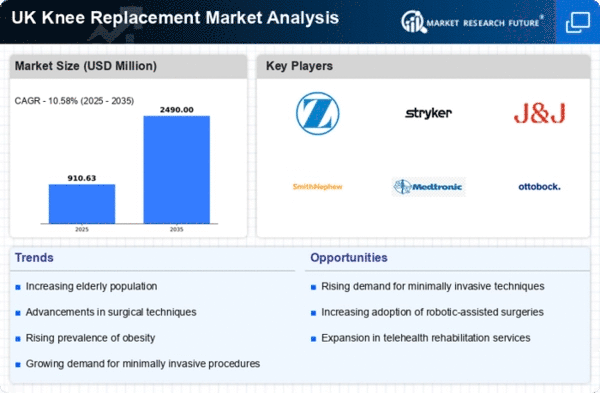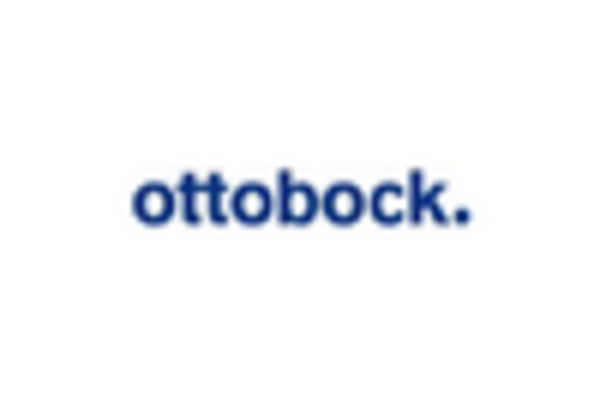Increased Healthcare Expenditure
The UK government has been progressively increasing its healthcare expenditure, which significantly impacts the knee replacement market. In recent years, the National Health Service (NHS) has allocated substantial funds towards orthopedic surgeries, including knee replacements. This financial commitment is indicative of the government's recognition of the growing need for effective treatments for joint-related ailments. As a result, the knee replacement market is poised for growth, with more resources being directed towards surgical procedures and rehabilitation services. Additionally, private healthcare providers are also investing in advanced technologies and facilities to cater to the rising demand for knee replacements. This trend suggests that the overall market could see an increase in the number of procedures performed, thereby enhancing accessibility for patients and potentially improving surgical outcomes.
Growing Awareness of Joint Health
There is a growing awareness of joint health among the UK population, which is positively influencing the knee replacement market. Public health campaigns and educational initiatives are increasingly informing individuals about the importance of maintaining joint health and the available treatment options for joint-related issues. This heightened awareness is leading to earlier diagnosis and intervention for conditions such as osteoarthritis, ultimately resulting in a greater number of patients seeking knee replacements. The knee replacement market is thus benefiting from this trend, as more individuals recognize the potential for surgical solutions to alleviate pain and restore mobility. Additionally, healthcare professionals are becoming more proactive in recommending knee replacements as a viable option for patients, further driving market growth. This shift in perception suggests that the market may continue to expand as awareness and understanding of joint health improve.
Rising Prevalence of Osteoarthritis
The increasing incidence of osteoarthritis in the UK is a primary driver for the knee replacement market. As the population ages, the prevalence of this degenerative joint disease escalates, leading to a higher demand for knee replacement surgeries. Recent data indicates that approximately 8.5 million people in the UK suffer from osteoarthritis, with knee joints being the most affected. This condition often results in chronic pain and mobility issues, prompting patients to seek surgical interventions. The knee replacement market is thus experiencing growth as healthcare providers respond to this rising demand. Furthermore, advancements in surgical techniques and implant technologies are enhancing patient outcomes, making knee replacements a more viable option for those suffering from osteoarthritis. Consequently, the market is likely to expand as more individuals opt for these procedures to regain mobility and improve their quality of life.
Technological Innovations in Implants
Technological innovations in knee implants are transforming the landscape of the knee replacement market. The introduction of advanced materials and designs, such as 3D-printed implants and personalized prosthetics, is enhancing the effectiveness and longevity of knee replacements. These innovations not only improve patient outcomes but also reduce the likelihood of complications, which is crucial for the knee replacement market. Furthermore, the integration of robotics and minimally invasive surgical techniques is streamlining the surgical process, leading to shorter recovery times and less postoperative pain. As these technologies become more widely adopted, the market is likely to experience a surge in demand, as patients are increasingly drawn to the benefits of cutting-edge solutions. This trend indicates a promising future for the knee replacement market, as ongoing research and development continue to yield improved products and techniques.
Demographic Shifts and Lifestyle Changes
Demographic shifts and lifestyle changes in the UK are contributing to the growth of the knee replacement market. As the population ages, there is an increasing number of individuals who are likely to experience joint-related issues. Moreover, lifestyle factors such as obesity and sedentary behavior are becoming more prevalent, which can exacerbate conditions like osteoarthritis. The knee replacement market is responding to these demographic trends by adapting to the needs of an aging population that requires effective solutions for joint pain. Additionally, the rise in physical activity among younger populations, despite the associated risks of injury, is also leading to an increase in knee surgeries. This complex interplay of demographic and lifestyle factors suggests that the market may continue to grow as healthcare providers seek to address the evolving needs of patients.
















